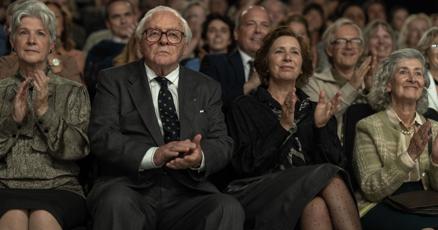Most stories begin at the beginning. Sometimes, if the storyteller is daring enough, it might begin in the middle.
“One Life” is one of those that started at the end.
Specifically, it began with a 1988 clip from the BBC television show “That’s Life,” which — after social media made such things possible — would go viral decades later for all the right reasons.
After seeing it, the makers of “One Life” knew they had to tell the story behind that clip.
Given its central role to the film’s third-act climax, we won’t describe it any further, except to say that if you’ve seen it, you’ll certainly remember it and the way it made happy, hopeful tears well up in your eyes.
And if you haven’t seen it? Director James Hawes’ lovely “One Life” — not to be confused with the hit-or-miss Bob Marley biopic “One Love” currently in theaters — will acquaint you with it.
A story in the key of “Schindler’s List,” it is built on a foundation of real-life horror — that is, the Holocaust — but one ultimately uplifted by hope and humanity. By the time it’s done, you can expect “One Life” to pack an emotional wallop, and in the most life-affirming sense.
Anthony Hopkins stars, playing an English chap named Nicholas Winton. When we meet him, it is 1988, and Winton is a distinguished, older gentleman with just enough curmudgeon in him to be unintentionally amusing.
He’s also at that stage of life in which people often find themselves reflecting upon their legacy. In Winton’s case, that legacy is a remarkable one.
Hawes shares it through two intertwining storylines set a half-century apart. One focuses on Winton of 1988 as he wrestles with the best way to ensure history is properly preserved. The other is told in flashback and focuses on the young Winton (Johnny Flynn), who, as a 29-year-old London stockbroker troubled by the rise of Adolf Hitler in 1938 Europe, decided to do something about it.
With support and encouragement of his idealistic mother (Helena Bonham Carter, terrific as always), Winton boards a train for Prague, where thousands of Jewish families from Germany and Austria — all fleeing the slowly building German war machine — are living amid fear and filth in refugee camps.
Working with a team of fellow British humanitarians, Winton takes it upon himself to figure out a way — despite unending knots of bureaucratic red tape and the ever-present threat of the German military — to whisk as many refugee children to safety as possible.
It wouldn’t be as simple as it sounds. First, there was the challenge of earning refugees’ trust. Then there was the task of acquiring the transit documents — “paperwork is everything,” one character says, echoing “Casablanca” — followed by the challenge of finding foster homes for each of the evacuated children.
Despite the challenges, they managed to save a trainload of children. So they did it again. And again.
The Germans would eventually shut their operation down, but not before they could save hundreds of children from certain death in concentration camps.
Director Hawes, whose career to this point has centered largely on British television, displays an admirably restrained hand as he tells Winton’s story. Although “One Life” is capably helmed in every regard, there’s nothing indulgent about it — nothing flashy or overly showy.
Of course, Hopkins always has a way of classing up a joint. He might not always choose the best scripts (“Thor: The Dark World,” anyone?), but he is almost always the best thing about whatever projects in which he appears.
He’s aided in “One Life” by a raft of strong supporting performances, although the real secret behind the film’s ultimate impact is its unexpected dose of modern relevance.
Yes, it is about WWII-era Jewish refugees. But it’s hard to watch “One Life” and not be reminded of the refugee crises in Europe, at the southern U.S. border, in Gaza.
And that might be where the real bittersweet heartbreak of “One Life” lies.
Yes, one person can, indeed, make an enormous difference in untold lives if they are determined enough. The tragedy is that we still need them to.
